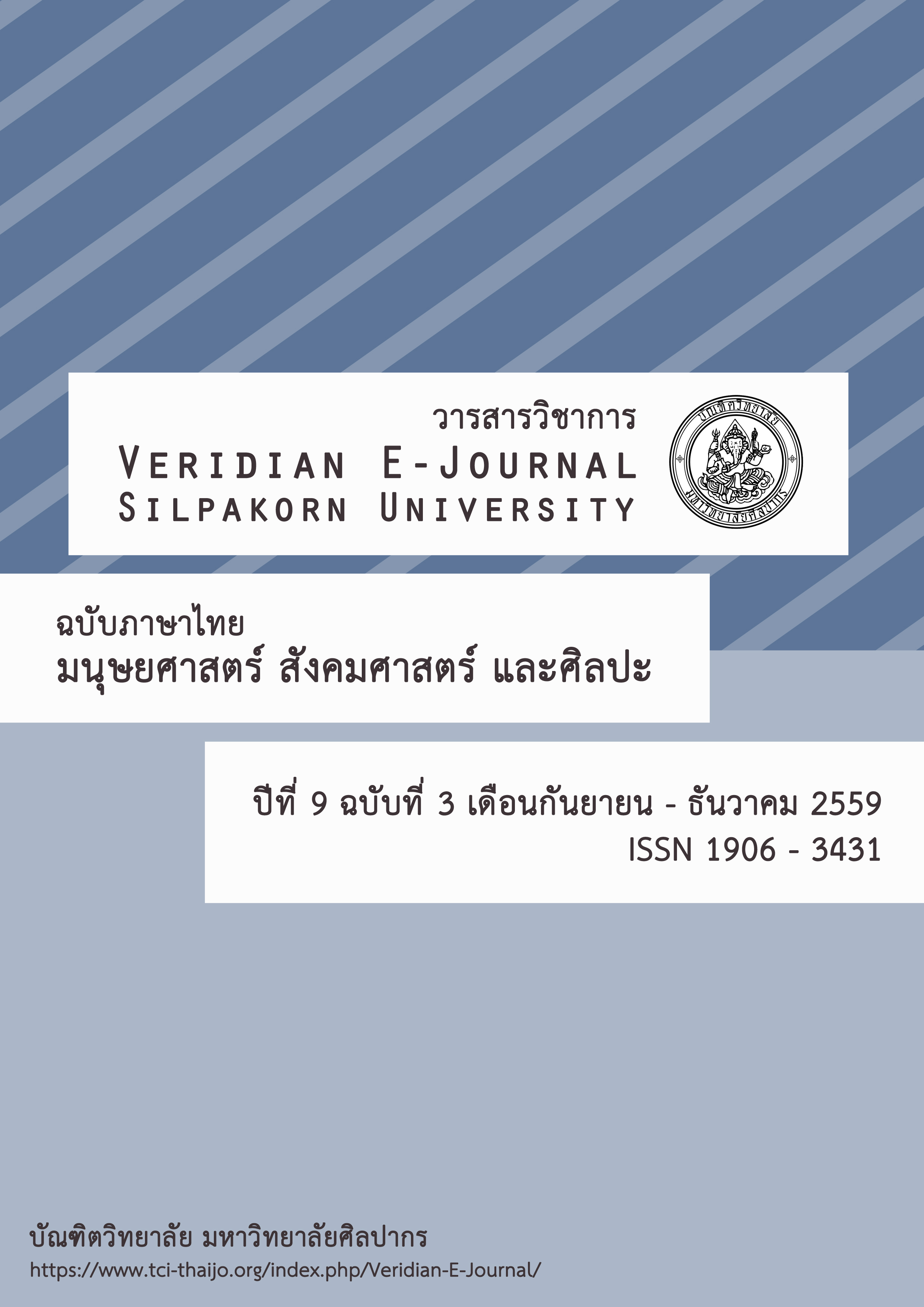การพัฒนาตัวชี้วัดและเกณฑ์การประเมินจิตวิทยาศาสตร์ของนักเรียนระดับ ชั้นมัธยมศึกษาศึกษาตอนต้น จังหวัดภูเก็ต
Main Article Content
Abstract
การวิจัยครั้งนี้มีวัตถุประสงค์เพื่อ 1) พัฒนาตัวชี้วัดจิตวิทยาศาสตร์ของนักเรียนระดับชั้นมัธยมศึกษาตอนต้น จังหวัดภูเก็ต 2) พัฒนาเกณฑ์การประเมินจิตวิทยาศาสตร์ของนักเรียนระดับชั้นมัธยมศึกษาตอนต้น จังหวัดภูเก็ต และ 3) ตรวจสอบความเหมาะสมของเกณฑ์การประเมินจิตวิทยาศาสตร์ ของนักเรียนระดับชั้นมัธยมศึกษาตอนต้น จังหวัดภูเก็ต กลุ่มตัวอย่างที่ใช้ในการวิจัย คือ นักเรียนระดับชั้นมัธยมศึกษาตอนต้นในโรงเรียนสังกัดสำนักงานเขตพื้นที่การศึกษามัธยมศึกษา เขต 14 จังหวัดภูเก็ต ปีการศึกษา 2558 จำนวน 520 คน โดยเลือกมาด้วยการสุ่มแบบแบ่งชั้น เครื่องมือที่ใช้ในการวิจัย ได้แก่ แบบวัดจิตวิทยาศาสตร์ซึ่งเป็นมาตรประมาณค่า 5 ระดับ การวิเคราะห์ข้อมูลประกอบด้วย การวิเคราะห์องค์ประกอบเชิงยืนยัน พัฒนาเกณฑ์การประเมินจิตวิทยาศาสตร์ด้วยการหาคะแนนจุดตัด และตรวจสอบความเหมาะสมของคะแนนจุดตัดด้วยค่าความไว และค่าความจำเพาะ
ผลการวิจัยพบว่า 1) ตัวชี้วัดจิตวิทยาศาสตร์ที่พัฒนาขึ้นมี 28 ตัวชี้วัด ครอบคลุมองค์ประกอบ 4 ด้าน ได้แก่ ความมีเหตุผล ประกอบด้วย 11 ตัวชี้วัด ความอยากรู้อยากเห็น ประกอบด้วย 5 ตัวชี้วัด ความใจกว้าง ประกอบด้วย 4 ตัวชี้วัด ความซื่อสัตย์และมีใจเป็นกลางพิจารณาอย่างรอบคอบก่อนตัดสินใจ ประกอบด้วย 8ตัวชี้วัด โมเดลการวัดจิตวิทยาศาสตร์ของนักเรียนมีความสอดคล้องกับข้อมูลเชิงประจักษ์ (Chi-square= 573.36, df=224, x2/df = 2.56, RMSEA=0.050, RMR=0.029, CFI=0.99)ความเที่ยงขององค์ประกอบมีค่าระหว่าง 0.82 - 0.94 2) คะแนนจุดตัดสำหรับประเมินจิตวิทยาศาสตร์ มีค่าเท่ากับ 99 คะแนนและ 3) เกณฑ์การประเมินจิตวิทยาศาสตร์ของนักเรียนที่จุดตัด เท่ากับ 99 มีความเหมาะสมโดยมีค่าความไวและค่าความจำเพาะเท่ากับ 78.57 และ 95.38 ตามลำดับ
The purposes of this research were 1) to develop indicators of scientific mind of lower secondary students in Phuket province; 2) to develop evaluation criteria of scientific mind of lower secondary students in Phuket province; and 3) to validate established evaluation criteria of scientific mind of lower secondary students in Phuket province.The research sample consisted of 520 students in lower secondary schools under the Secondary Education Service Area Office 14 in Phuket province in 2015, obtained by stratified random sampling.The tool used in this research was a scientific mind assessment, which was a 5-scale rating questionnaire. The statistical data analysis included the confirmatory factor analysis, constrasting group method used for validing the developed evaluation criteria, sensitivity and specificity.
The results showed that 1) the developed scientific mind assessment consisted of 28 indicators covering 4 factors : rationality (11 indicators),curiosity (5 indicators),open-mindedness (4 indicators), honesty and suspended judgment (8 indicators). The measurement model of scientific mind fitted empirical data (Chi-square= 573.36 , df=224, x2/df = 2.56, RMSEA=0.050, RMR=0.029, CFI=0.99).The factor reliability coefficients ranged from .82 to .94. 2) The cut score for evaluating of scientific mind was set at 99; and 3) Evaluation criteria of scientific mind determined by the cut score of 99 was appropriate, with sensitivity index and specificity index of 78.57 and 95.38, respectively.
